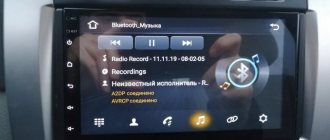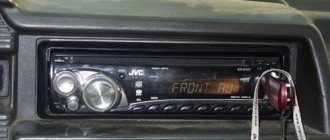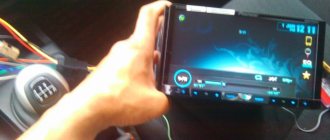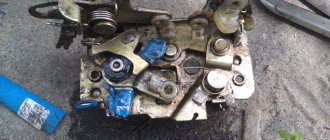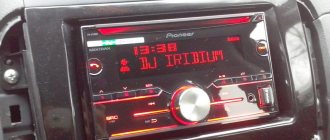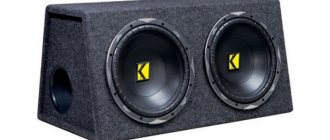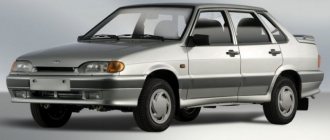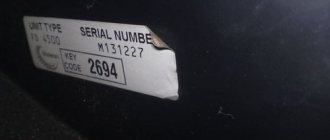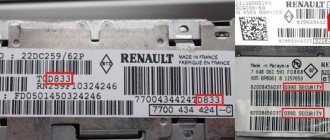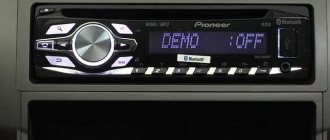Incorrect speaker connections
Incorrect connection of wires contributes to spontaneous turning off and turning on of the radio. At the moment of a sharp increase in performance (engine starting), the connections are closed. To fix the problem, you need to do the following:
- remove the device;
- assess the tightness of the cables to the terminals;
- fix the breakdown by inserting the wire all the way.
If the device still turns off after repair, you should inspect the cables for damage. Diagnostics and troubleshooting are carried out as follows:
- the tape recorder is turned on;
- set the average volume level;
- alternately disconnect and return the speaker plug to its place;
- add sound.
If the device does not turn off when adjusting the sound, the problem should be looked for in the wires leading to the speakers. The damaged element should be completely replaced. If the problem cannot be fixed, it is recommended to contact a specialist.
Surge protection
Manufacturers of car radios, in an effort to extend the life of their devices, install voltage limiters. The overload protection system often causes the tape recorder to turn off when you turn up the volume. If the search for other faults does not produce results, the reason should be sought in the presence of a limiter. As volume increases, power consumption increases. When the maximum voltage is reached, the radio will turn off.
The specialists refuse to fix the problem. If you remove the protection, the device may break. If the owner still decides to get rid of the limiter, he will have to carry out the repairs himself. The work order includes the following steps:
- Installation of amplifiers located between the speakers and the audio device. This helps increase the sound volume without changing the voltage in the tape recorder.
- Checking the wires connecting the radio to the speakers. When identifying crushed or twisted cables, the cause should be looked for in them. Damaged parts of the system are replaced with new ones.
Lack of power supply
If the car radio turns on and immediately turns off by itself, the cause should be sought in the following faults:
- Connecting an audio device to a power source with thin wires. If the cable thickness does not exceed 0.5 mm, the device will not have enough power. The voltage drop is so pronounced that the radio turns off spontaneously when listening to music at high volume.
- Incorrect power supply connection. When the high beam is turned on, the radio stops working if the quality of the connection of the wires of the negative pole of the device is poor. When connecting the “plus”, the integrity of the wire leading from the ignition switch to the dashboard is often damaged. In this case, car owners simply clean and connect the broken ends. In this case, not only the radio does not work correctly, but also the speedometer. If erroneous codes appear when diagnosing the engine management system, the radio is connected to the power circuit incorrectly.
Reconnecting the device to the on-board network helps to cope with the problem. When performing work, cables with a thickness of at least 0.75 mm are used. To connect powerful car radios, use wires with a cross-section of 1 mm or more. The negative wire is connected as follows:
- a pin located under the dashboard stands out and is cleaned with sandpaper;
- take the end of the wire with a terminal of the appropriate size;
- the terminal is put on a stud, the connection is secured with a nut;
- The positive cable is connected to the car battery.
A connection made using this method is well suited for connecting powerful car radios and amplifiers.
Solutions and tips
To determine whether a car radio is defective, you should remove it from the car and take it to a service center that repairs audio equipment. If a fault is discovered that cannot be repaired, you will have to buy a new device. Speakers with a voice coil impedance of less than 4 ohms should not be used. This will sooner or later lead to failure of the audio system due to overheating and burnout of the power amplifier chip.
To identify and fix speaker problems, you should check your speaker cables for twisted, frayed, or damaged wires. If extensive defects are found, the entire wiring should be changed. You can do this yourself or at a car service that specializes in car audio.
When connecting connectors, you must ensure that the leads do not come into contact with the speaker housings to prevent a short circuit.
To solve problems with overvoltage protection, you can install an additional amplifier or replace the audio device with a more powerful one.
To eliminate the power shortage, you should reconnect the car radio to the on-board network. Wires with a thickness of at least 0.75 mm should be used. The more powerful the device, the thicker the wire. The most reliable connection of the negative pole is carried out as follows.
A stud is found under the instrument panel, which is cleaned of paint, dust, dirt and oil. Then take a piece of wire with a “chip” that has a hole of a suitable diameter. One end is connected to the radio, the chip is put on a pin and screwed tightly with a nut and a spring washer. The positive wire connects directly to the car battery. The connection made in this way will be the most reliable. This especially applies to powerful radios, as well as active subwoofers (with an amplifier).
Insufficient battery power
If the radio constantly turns off when the volume increases, the reason should be sought in the low power of the battery. When the engine is running, the battery power drops sharply, which is why there is not enough voltage to operate additional devices. Installing capacitors on radios helps solve this problem.
You should look for problems in the battery itself. Malfunctions in the operation of audio devices occur when using an old-style battery. The battery may need to be fully charged. It is also recommended to check the wiring connecting the battery to the on-board network.
I'll start from the beginning. It was already in the blog that the left speaker did not work. after my previous repair it still worked. but not as much as I would like. In general, the wire was a little broken somewhere. and the sound on the pits sometimes disappeared. Also, there was this problem: when the music was turned on loudly, the radio would turn off and turn on again... and if I turned down the volume, everything became normal... and if not, then it constantly rebooted. My assumption was that perhaps this wire that goes to the column has a short circuit somewhere and because of the loud switching on, a reboot occurs. I went to the market and bought 2 meters of acoustic wire (well, I’m thinking of changing the wire for 2 at once) and took out the speaker. I disconnected the old wires from it. I screwed a new wire onto electrical tape to run it under the dashboard.
Recommendations
Comments 20
This blue crap is a clamp for inserting into the wire without breaking the integrity.
it cuts through the insulation...
integrity of the conductor itself
I actually have horns in these places, I haven’t found any other use for the standard places for speakers) but the pancakes themselves are already in the doors, but there are podiums and generally good acoustics were very expensive. An ordinary radio tape recorder will never drive 4 speakers, no matter what they are, the radio tape recorder has 50W per speaker, and speakers with at least a 70W rating are available everywhere, I have never found out the peak power of the radio tape recorder, useless information. You can take an amplifier of at least 400-600W from some unknown company and run all the speakers through it. If you don’t bother with all this, in order to get rid of wheezing and everything else that irritates, put some ovals on the rear shelf and set the sound on the radio in the settings to them, it should turn out that the main sound will come from them, in front there will only be high and slightly midrange. As a result, at high volumes, you will still mostly hear the rear.
but if I’m carrying, let’s say, rear passengers... then they will be yelled at harshly... but for me, as usual) that’s what I’m worried about)
Well, yes, there will be such a problem with the rear passengers... But you always have to sacrifice something... I usually neglected the rear passengers, and in general I’m not a fan of driving with a full car) Besides, you can always make it quieter. I have a more expensive option, in the dashboard there are horns in the standard places for the speakers, these are only high frequencies, they are direct to the radio. 4 speakers, a stage, sort of 16 in size, through an amplifier, and in the trunk there is a separate subwoofer with a separate amplifier. Since the speakers are stage, they produce high-quality sound, a high-quality voice and, again, no bass, everything that can be cut by the amplifier + radio settings. But all this is very expensive. About 100,000 rubles were poured into the music, provided that he staged everything himself. Not everyone can afford to spend hundreds on music and not everyone will even bother with all this...
the car is not worth as much as you threw into the music)
The car has long been gold, everything is written in the description... And from the very beginning it was clear that it would never be sold for the amount that was invested in it...)
I did everything right. It’s better to connect + through the fuse directly to the battery, to the housing. . Use thick wires and it is advisable to shield them with foil. I've never had any complaints about the Pioneer's acoustics; that's all I use myself)
When listening to the radio in a car, especially with a fairly powerful audio system with good subwoofers and tweets, many devices experience malfunctions. Most often, car enthusiasts ask the question, why does the radio turn off when the volume is increased? Indeed, turning off the device when the volume is increased, especially when transmitting power to the bass, in a car audio system often turns off the radio.
Reason #2
Another very popular reason why the radio in a car refuses to “move the drive” is that the device is quite dirty. After all, this device is often used in difficult conditions. Here, dust on optical and mechanical parts is common. Usually, if the mechanical insides are dusty, the driver will notice failures when playing discs, freezes, and the inability to read the disc at all.
This disease can be cured. This is done in the same way as in the case of home appliances. It is necessary to disassemble the drive and then clean the lens. In most cases, this is enough to listen to your favorite music on the road again.
Malfunctions when connecting speakers to the radio
Incorrect connection of speaker wires to the radio connectors can also cause spontaneous shutdowns of the device. Especially when you start a car engine with a short-term increase in power, a short circuit occurs in the wires with an incomplete connection (input to the plug). To eliminate this malfunction, you need to visually check the contact level and, if necessary, insert the speaker plugs into the radio connectors more tightly.
You can also check the integrity of the wires leading to the speakers: turn on the radio at normal volume and disconnect the speakers one by one, increasing the volume. If the radio does not turn off when you increase the volume, then you can understand that the malfunction lies there. Replacing the speaker wire or contacting technical service helps.
Surge protection in the radio itself
This is the most common reason why the radio turns off when the volume is turned up. Many drivers, when contacting a car service center, hear from specialists that the radio is equipped with overvoltage protection, which is triggered when the power increases. Adding sound to the radio leads to an increase in power consumption from the battery, which can lead to automatic muting. It is impossible to bypass this protection, because... otherwise, the radio may burn out completely. To solve the problem of surge protection, experts recommend installing an amplifier between the radio and speakers (see video on how to do this here).
Another way to solve the problem of the radio automatically turning off when the volume increases is to check the wires leading from the radio to the speakers, which may have a short circuit. Check all the wires leading to the speakers one by one - if there are any that are pinched or twisted, then by changing their position to the correct one, the problem with the operation of the radio may disappear. If the wires are severely damaged, it would be advisable to replace them with new ones.
When starting the engine, the radio turns off: why does this happen?
Let's start with the fact that during operation of many cars, drivers notice when starting the engine that the radio tape recorder fails, the head unit turns off for a few seconds, then turns on automatically, etc. Note that this often happens with non-standard car radios, that is, when the head unit in a car is from a third-party manufacturer.
In this case, this situation in the vast majority of cases is not a malfunction, but the possibility of malfunctions should not be completely excluded. In this article we will talk about why, when starting the engine, the radio turns off and the dashboard lights dim.
Lack of car radio power supply
When you turn up the volume on the speakers, the radio may also turn off because the cross-section of the wires cannot withstand the load, causing the fuse to trip. To solve this problem, you need to change the wires to thicker ones, and also power the radio directly from the battery. In 90% of cases, this helps to get rid of problems in the operation of the radio, as well as improve its performance: the device will work even when the engine is started, with the cigarette lighter working and the phone being charged.
Insufficient battery power
If there is a malfunction of the battery, or if the battery power is insufficient, a drawdown occurs when the engine is started, which is why the available voltage is not enough to operate the car radio. In this situation, installing a capacitor on the radio, as well as troubleshooting the battery itself, can help. Old car batteries can also cause a similar problem with the audio system. The battery may need to be rewired or fully charged.
How to prevent the radio from turning off
The generator and starter need to be checked. A short circuit in the windings is determined by their darkening or heating of faulty parts and components. Leaks in the battery case can be detected using a tester. To do this, touch one of the battery terminals with one probe of the device, and touch different points of the case with the other. A deviation of the arrow will indicate the presence of a leak. To eliminate it, you should wipe the car battery case. The tester will also help you more accurately check the starter, generator and wiring for short circuits or leaks. Faulty parts and assemblies must be replaced.
You can prevent the radio from turning off when you start the engine by replacing a worn or weak battery with a more powerful one if its capacity does not match the engine parameters. As a result, the voltage in the vehicle’s on-board network will drop less when the engine starts. It is necessary to check the car wiring for damage.
If the radio was connected through the ignition switch, then it is recommended to connect it directly to the battery. This helps relieve the load on the ignition switch and will protect the receiver from turning off when starting the car engine. If the radio continues to turn off, it should be turned off manually before starting the engine, and then turned on again.
